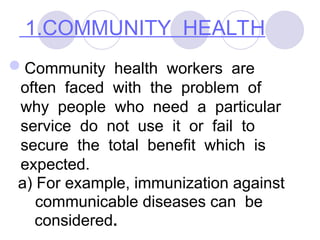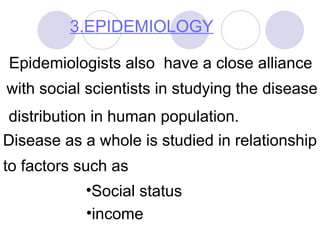MEDICAL EDU SOCIAL CONTEXT OF MEDICINE.ppt
- 2. •The seeds that medicine is a social science INTRODUCTION were sown late in the 19th century by pioneers such as Neumann and Virchow. •Development in the field of social sciences discovered that disease has -Social causes -Social consequences -Social therapy
- 3. This topic deals with the importance of Social knowledge in the field of Medicine. Health cannot be isolated from its social . Context. . Successful application of medicine to Individuals and groups involves more than mere scientific or biological Knowledge.
- 4. It involves an understanding of the behaviour of individuals and groups who live together and share certain values of life. •Concepts of sociology are increasingly being used in the study of diseases in human societies The effect of social changes on health of people is shown in the following Fig.
- 5. Social factors Predisposing factors Health outcome CURRENT CIRCUMSTANCES INDIVIDUAL PREDISPOSITIONS ECOLOGICAL PREDISPOSITIONS OPPURTUNITIES HEALTH ECONOMIC POLITICAL RELIGIOUS EDUCATIONAL DEMOGRAPHIC MIGRATION URBANISATION MARRIAGE FERTILITY OTHERS
- 6. Specialists in community health, clinical medicine, epidemiology are all seeking the cooperation and help of social scientists in understanding problems such as social component of health, “illness behavior” of people, etc. •The health status of an individual in a community is mainly determined by his social class in the community.
- 7. •Educational characteristics-literacy level,etc Social scientists have used occupation widely as a means of determining the level of social standing of an individual in a Community. •Occupation is a major determinant of 1.Economic rewards 2.Extent of authority 3.Degree of status 4.Values and life styles.
- 8. 1.COMMUNITY HEALTH Community health workers are often faced with the problem of why people who need a particular service do not use it or fail to secure the total benefit which is expected. a) For example, immunization against communicable diseases can be considered.
- 9. SOCIAL CLASS People in a community are differentiated by certain characteristics which they bear. They may be •Personal characteristics-age, sex, marital status, etc. •Economic characteristics-occupation •Cultural characteristics-language, religion, caste, etc.
- 10. Although there is a wide range of prophylactic vaccines, immunization has not gained universal acceptance. b)The family planning programme in India is a recent example of a health service of which people are not making use to the extent desired.
- 11. Similarly, health programmes relating to mother and child health care services, improvement of water supplies, installation of sanitary latrines have all proved abortive or only partly successful. The central question in community health is :why do people behave as they do?
- 12. Social scientists in India are asked to explain this failure of health measures. The theme common to community health and social sciences is human behavior.
- 13. 2.CLINICAL MEDICINE The present day clinicians believe that “psycho physiological stress reactions” are involved in cases of rheumatoid arthritis, obesity, g.i.t ulcers, constipation, diarrhoea and epilepsy. Control of these diseases involves not merely medical care but basic changes in the behaviour and habits of the patients.
- 14. The social scientists are asked to investigate the life situations of the patients in a view to discover linkages between specific life situations and specific cases of illness. “ILLNESS BEHAVIOUR” Why different people react in different ways to the same disease progress or treatment regimen.
- 15. Medical sociology deals with the following: 1)Doctor-patient relationship 2)Patient care management 3)Hospital management 4)Cultural practices
- 16. For a physician to serve the patient and the community, he needs two kinds of Knowledge: 1.Medical knowledge 2.Social knowledge The present day medical sciences (e.g., Anatomy, pathology) are insufficient to train the physician to cope with social aspects of medicine.
- 17. 3.EPIDEMIOLOGY Epidemiologists also have a close alliance with social scientists in studying the disease distribution in human population. Disease as a whole is studied in relationship to factors such as •Social status •income
- 18. •occupation •housing •over crowding •social customs •Habits and behaviour The health standards of an individual in a community are determined mostly by his social class in the community.
- 19. •Social class and health Income, occupation and education which are the major components of most measures of social class are generally positively correlated with health status. Individuals in upper social class have a longer life expectancy, less mortality and a better health and nutritional status than those in the lower class.
- 20. Diseases like coronary heart disease, Hypertension, diabetes all have been shown to have a high incidence in Social class 1. Diseases of skin, eye and ears, diarrhoea and dysentery have shown a higher in lower class, which can be ascribed to The poor status of physical environment In which they live.
Editor's Notes
- #10: India is a recent example




















